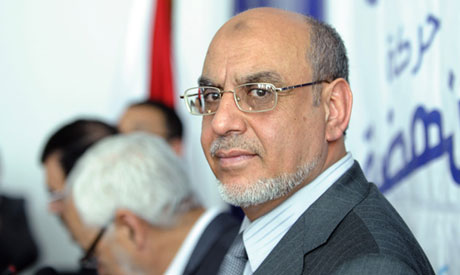
Hamadi Jebali, the 63-year-old Ennahda secretary general, was named Wednesday as the party’s candidate for prime minister.(Photo: AFP)
With deep roots in the fight against anti-Muslim oppression, Hamadi Jebali emerged from years in jail under a repressive regime as a man of compromise and the moderate face of Tunisia's Ennahda Islamist party.
With his neatly trimmed white beard, thin-framed glasses and the prayer mark of the pious Muslim on his forehead, Jebali "has been one of the main players on the Islamic scene" in Tunisia, Sofiene Ben Fahrat, editor of Tunisia's La Presse daily told AFP.
"He notably led the confrontation against the regime of (Habib) Bourguiba," the father of independent Tunisia who launched a repressive campaign against Islamists and had several of its leaders sentenced to death, he said.
Jebali, a native of the eastern town of Sousse, known as the "Pearl of the Tunisian Sahel," is a solar engineer and former journalist who co-founded in 1981 the Islamic Tendency Movement that became Ennahda (Renaissance in Arabic) eight years later.
The party came out on top in Tunisia's first free elections on October 23.
A former editor of Ennahda's Al Fajr newspaper, Jebali was sentenced in 1991 to a year in prison for defamation. A year later, as the anti-Islamist repression under Zine el Abidine Ben Ali gathered steam, he was sentenced to another 16 years behind bars.
He served a large part of his sentence in an isolation cell before being pardoned in 2006.
Described as relaxed and quick to smile, well dressed and a fluent French speaker, Jebali "has always had good press, is well connected, and has a fat contact book," Fahrat said.
"He has positioned himself in the reformist camp of Ennahda, a party held back by several (conservative) tendencies," he added.
"In putting him forward as prime minister, Ennahda is sending a strong message both to the outside world and its own supporters."
After the uprising that ousted Ben Ali in January, Jebali travelled to Washington with two other "modernist" party members, holding high-level talks with US representatives in a bid to calm fears, according to Tunisian media.
"He is well known to the Americans," a diplomatic source in Tunis confirmed, adding he had been "greatly impressed" by Jebali.
"He is very calm, self-assured, and expresses himself in a measured fashion," said the source. "But he is not soft; his years in prison forged a character of steel."
In an interview with France's Le Monde newspaper ahead of the election, Jebali sought to deliver a reassuring message: "If we win the elections, Tunisia will not become an Islamic country, it will be a democratic country," he said and stressed Ennahda was not a "theocratic" party.
Questioned about fears of a ban on alcohol sales and abolition of the right of people not to fast during the Muslim holy month of Ramadan, he said: "We do not have the right to interfere in people's personal affairs, but everybody must respect the consensus and the national identity."
Short link: